2023年冀教版中考英语一轮复习 第五课时 八年级上册(Unit 1~Unit 2)课件(共44张PPT)
文档属性
| 名称 | 2023年冀教版中考英语一轮复习 第五课时 八年级上册(Unit 1~Unit 2)课件(共44张PPT) | 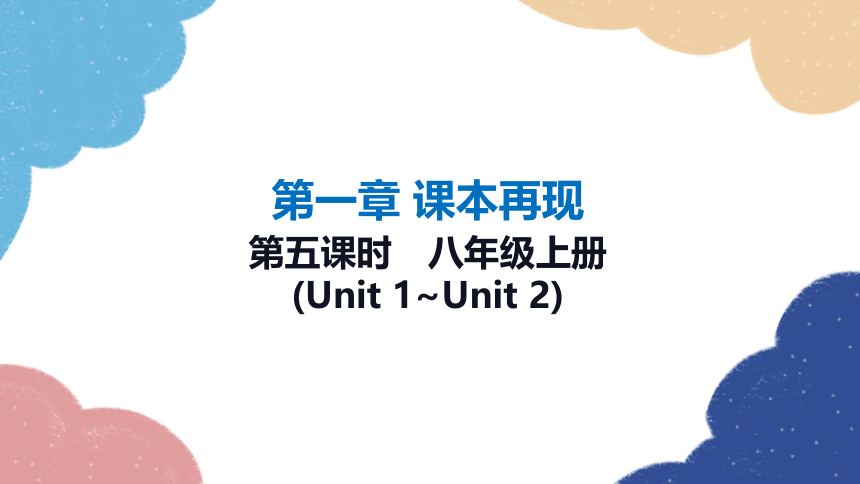 | |
| 格式 | pptx | ||
| 文件大小 | 475.8KB | ||
| 资源类型 | 教案 | ||
| 版本资源 | 冀教版 | ||
| 科目 | 英语 | ||
| 更新时间 | 2023-05-26 15:46:51 | ||
图片预览

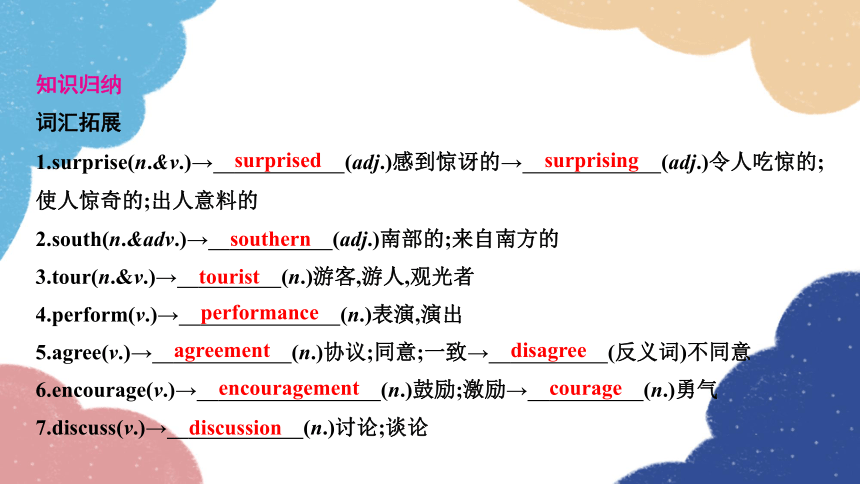
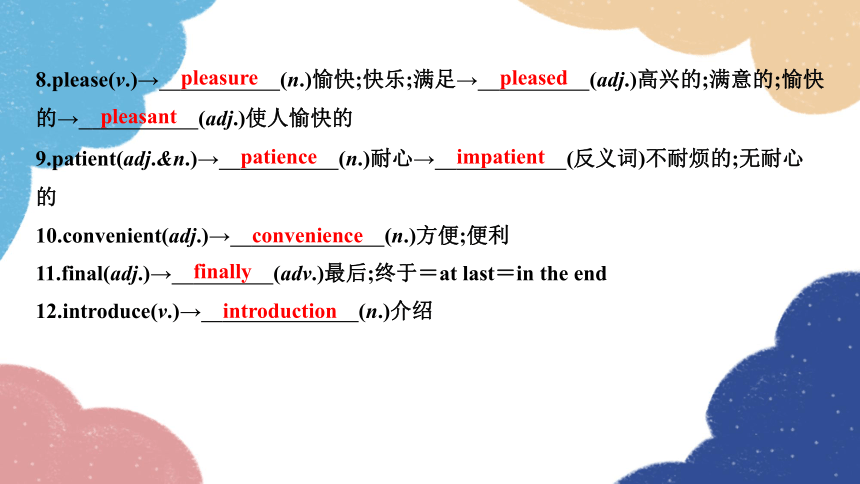
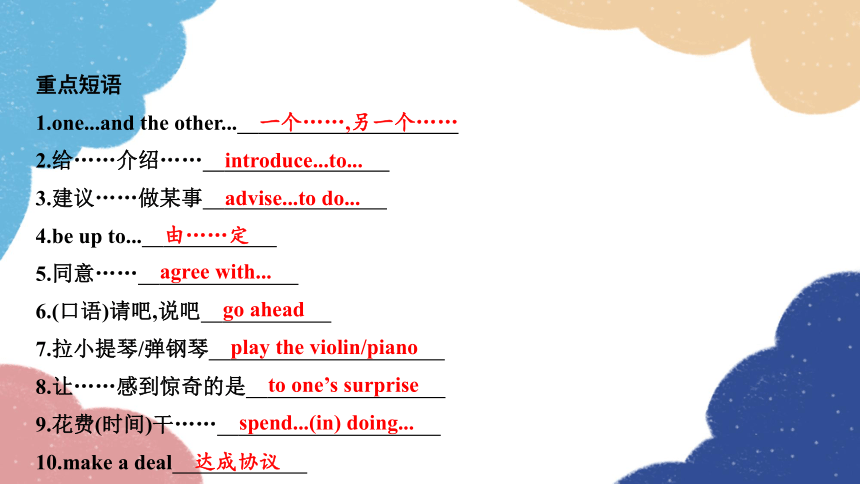
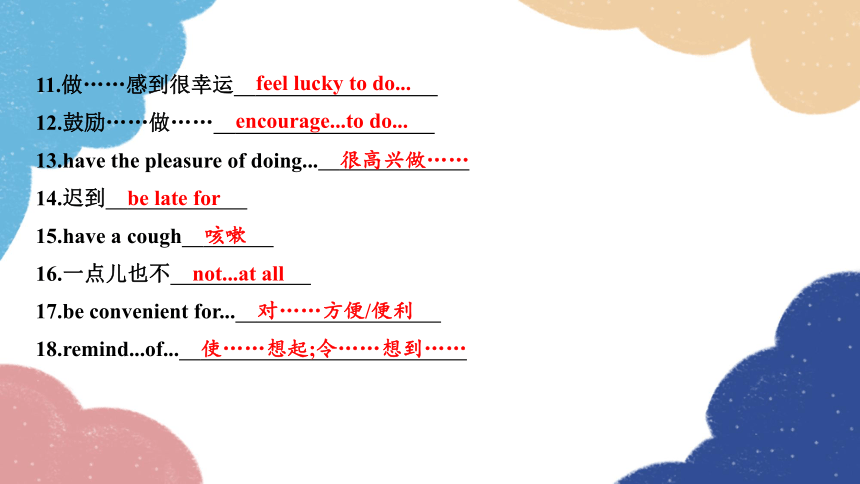
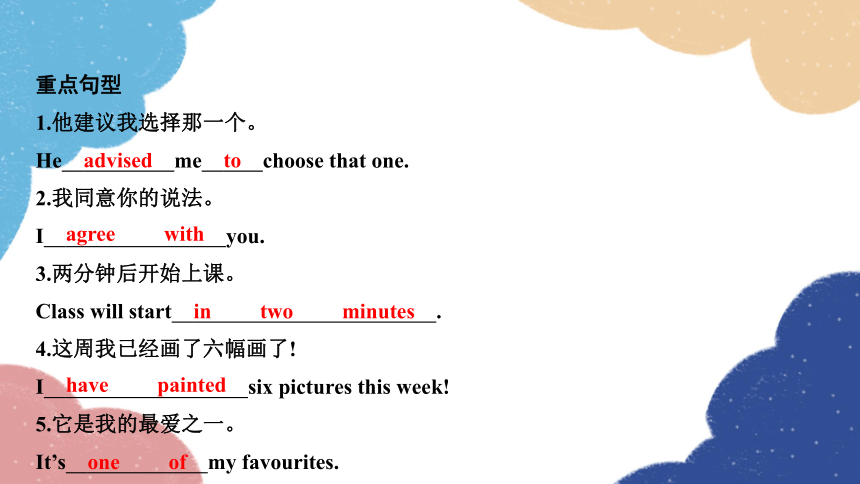
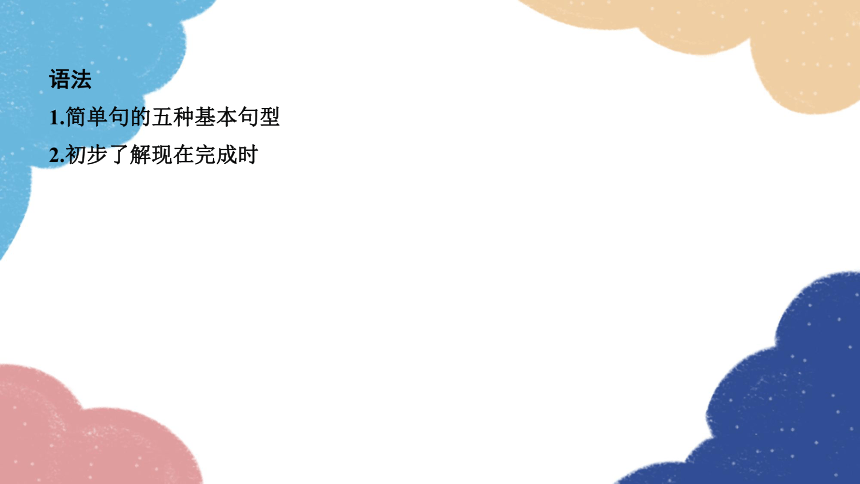
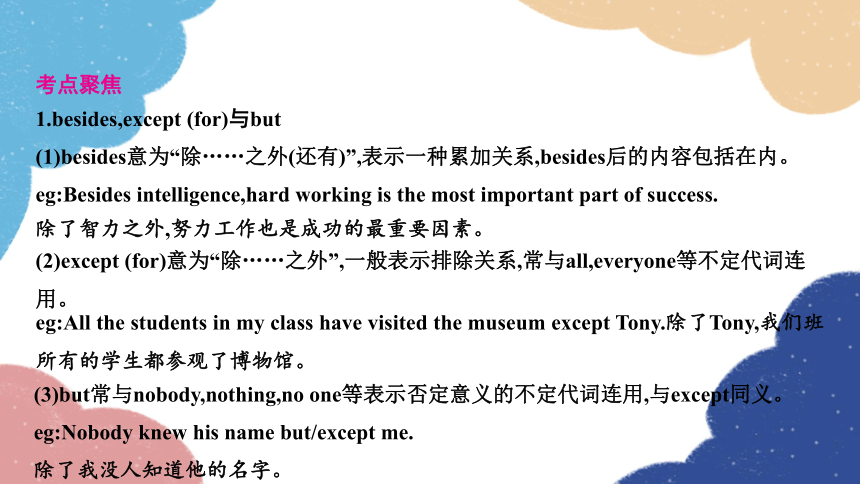
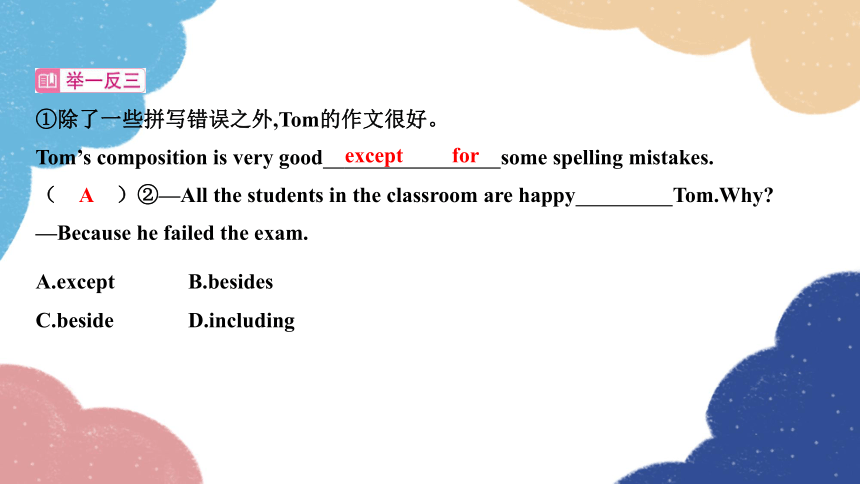
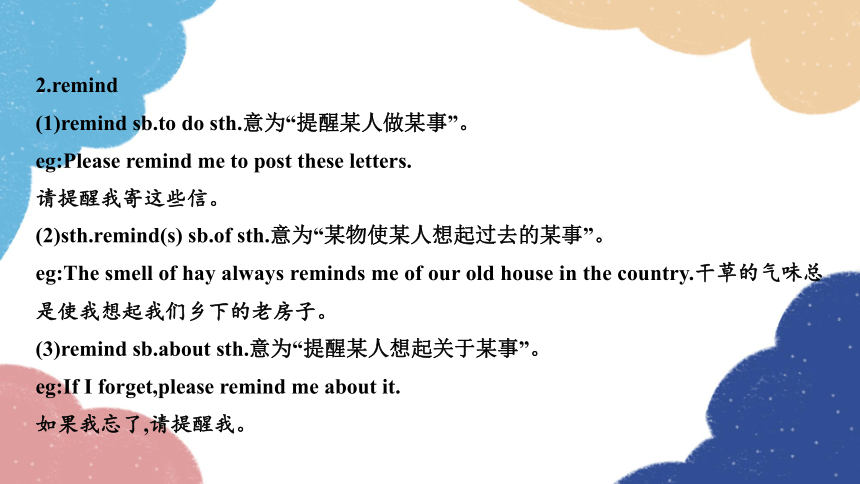
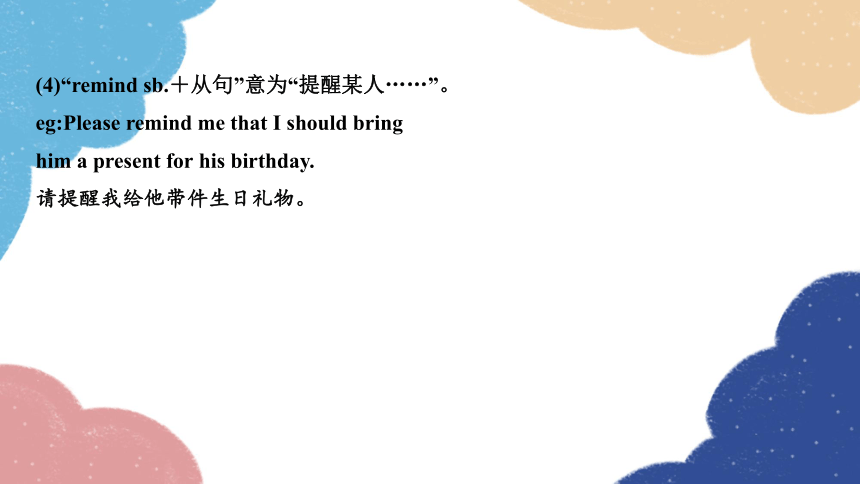
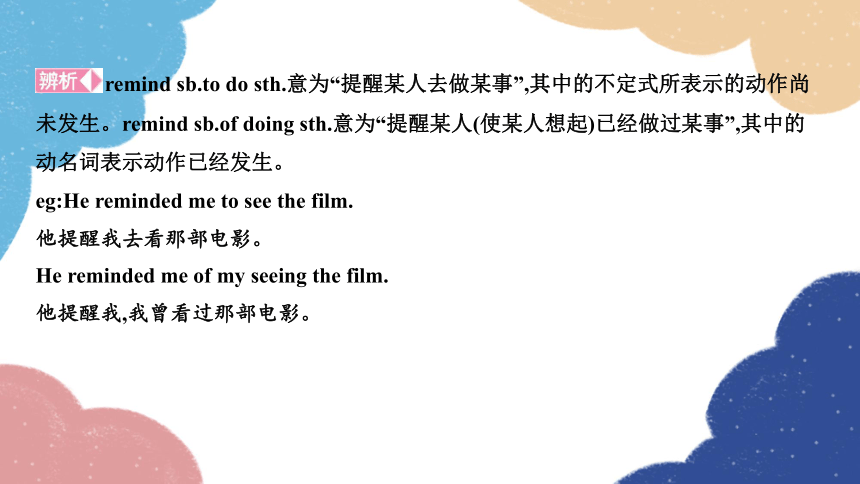
文档简介
(共44张PPT)
第五课时 八年级上册(Unit 1~Unit 2)
第一章 课本再现
知识归纳
词汇拓展
1.surprise(n.&v.)→ surprised (adj.)感到惊讶的→ surprising (adj.)令人吃惊的;使人惊奇的;出人意料的
2.south(n.&adv.)→ southern (adj.)南部的;来自南方的
3.tour(n.&v.)→ tourist (n.)游客,游人,观光者
4.perform(v.)→ performance (n.)表演,演出
5.agree(v.)→ agreement (n.)协议;同意;一致→ disagree (反义词)不同意
6.encourage(v.)→ encouragement (n.)鼓励;激励→ courage (n.)勇气
7.discuss(v.)→ discussion (n.)讨论;谈论
surprised
surprising
southern
tourist
performance
agreement
disagree
encouragement
courage
discussion
8.please(v.)→ pleasure (n.)愉快;快乐;满足→ pleased (adj.)高兴的;满意的;愉快的→ pleasant (adj.)使人愉快的
pleasure
pleased
pleasant
9.patient(adj.&n.)→ patience (n.)耐心→ impatient (反义词)不耐烦的;无耐心的
10.convenient(adj.)→ convenience (n.)方便;便利
11.final(adj.)→ finally (adv.)最后;终于=at last=in the end
12.introduce(v.)→ introduction (n.)介绍
patience
impatient
convenience
finally
introduction
重点短语
1.one...and the other... 一个……,另一个……
2.给……介绍…… introduce...to...
3.建议……做某事 advise...to do...
4.be up to... 由……定
5.同意…… agree with...
6.(口语)请吧,说吧 go ahead
7.拉小提琴/弹钢琴 play the violin/piano
8.让……感到惊奇的是 to one’s surprise
9.花费(时间)干…… spend...(in) doing...
10.make a deal 达成协议
一个……,另一个……
introduce...to...
advise...to do...
由……定
agree with...
go ahead
play the violin/piano
to one’s surprise
spend...(in) doing...
达成协议
11.做……感到很幸运 feel lucky to do...
12.鼓励……做…… encourage...to do...
13.have the pleasure of doing... 很高兴做……
14.迟到 be late for
15.have a cough 咳嗽
16.一点儿也不 not...at all
17.be convenient for... 对……方便/便利
18.remind...of... 使……想起;令……想到……
feel lucky to do...
encourage...to do...
很高兴做……
be late for
咳嗽
not...at all
对……方便/便利
使……想起;令……想到……
重点句型
1.他建议我选择那一个。
He advised me to choose that one.
2.我同意你的说法。
I agree with you.
3.两分钟后开始上课。
Class will start in two minutes .
4.这周我已经画了六幅画了!
I have painted six pictures this week!
advised
to
agree with
in two minutes
have painted
5.它是我的最爱之一。
It’s one of my favourites.
one of
语法
1.简单句的五种基本句型
2.初步了解现在完成时
考点聚焦
1.besides,except (for)与but
(1)besides意为“除……之外(还有)”,表示一种累加关系,besides后的内容包括在内。
eg:Besides intelligence,hard working is the most important part of success.
除了智力之外,努力工作也是成功的最重要因素。
(2)except (for)意为“除……之外”,一般表示排除关系,常与all,everyone等不定代词连用。
eg:All the students in my class have visited the museum except Tony.除了Tony,我们班所有的学生都参观了博物馆。
(3)but常与nobody,nothing,no one等表示否定意义的不定代词连用,与except同义。
eg:Nobody knew his name but/except me.
除了我没人知道他的名字。
①除了一些拼写错误之外,Tom的作文很好。
Tom’s composition is very good except for some spelling mistakes.
( A )②—All the students in the classroom are happy Tom.Why
—Because he failed the exam.
A.except B.besides
C.beside D.including
except for
A
2.remind
(1)remind sb.to do sth.意为“提醒某人做某事”。
eg:Please remind me to post these letters.
请提醒我寄这些信。
(2)sth.remind(s) sb.of sth.意为“某物使某人想起过去的某事”。
eg:The smell of hay always reminds me of our old house in the country.干草的气味总是使我想起我们乡下的老房子。
(3)remind sb.about sth.意为“提醒某人想起关于某事”。
eg:If I forget,please remind me about it.
如果我忘了,请提醒我。
(4)“remind sb.+从句”意为“提醒某人……”。
eg:Please remind me that I should bring
him a present for his birthday.
请提醒我给他带件生日礼物。
remind sb.to do sth.意为“提醒某人去做某事”,其中的不定式所表示的动作尚未发生。remind sb.of doing sth.意为“提醒某人(使某人想起)已经做过某事”,其中的动名词表示动作已经发生。
eg:He reminded me to see the film.
他提醒我去看那部电影。
He reminded me of my seeing the film.
他提醒我,我曾看过那部电影。
( A )①Mother’s Day us once every year to be thankful to mothers.
A.reminds B.warns
C.requires D.promises
( C )②Could you remind me some meat I want to make dumplings this
evening.
A.buying B.buy
C.to buy D.bought
A
C
( D )③Thanks for reminding me I should take an umbrella.The weather
here is really changeable.
A.what B.when
C.why D.that
④Be sure to remind her to come (come) back early.
D
to come
3.either,also,too与as well
(1)either表示“也”时,一般只用于否定句,且只置于句末。它还可以表示“两者之一”的意思,常和or连用,构成连词词组either...or...,意为“要么……要么……;或者……或者……”。either...or...连接两个主语时,谓语动词应与最近的一个主语在人称和数上保持一致,这就是我们通常说的“就近原则”。
eg:I didn’t go to school,either.
我也没去上学。
Either you or I am going to Beijing.
要么你,要么我去北京。
(2)also是比较正式的用语,语气较庄重。它经常放在句中,位于行为动词之前,系动词、助动词或情态动词之后。
eg:She’s fluent in French and German.She also speaks a little Italian.
她的法语和德语讲得流利。她也会说一点意大利语。
(3)too是个常用词,多用于口语中,语气较随便。它一般用在肯定句的句末。
eg:When I’ve finished painting the bedroom,I’m going to do the kitchen,too.
我粉刷完卧室后,还要粉刷厨房。
(4)as well与too位置相同,也用于肯定句句末,两者可互换,其前不需要加逗号。
eg:They will come as well.
他们也会来。
( A )①Lisa can speak French well.My brother can speak it well, .
A.too B.either C.as well D.also
( D )②Sue doesn’t know the answer to the
question.Jim doesn’t know it, .
A.still B.too C.also D.either
( C )③My friend Frank likes singing and he is good at playing the violin.
A.either B.as well
C.also D.too
A
D
C
4.agree的用法
(1)agree可单独使用,后还可跟动词不定式和宾语从句,表示“同意做某事;一致认同/同意”。
(2)agree with表示“同意某人的话或观点”,后常跟人或某人的话、观点等。
(3)agree to表示“同意(计划、建议、决定等)”,后跟表示提议、办法、计划等的词。
(4)agree on sth.意为“就某事达成共识/一致”,主语多是协商事情的人或单位。
eg:I quite agree with you.
我很同意你的意见。
Do you agree to this plan
你同意这个计划吗
We haven’t agreed on the price.
我们还没有商定好价格。
( C )①They all Laura about building a museum here.
A.agreed to B.belonged to
C.agreed with D.began with
( A )②We all agree Li Lin is the best person to join in this competition.
A.that B.when
C.who D.what
( B )③After a heated discussion,we agreed the plan at last.
A.with B.on C.in D.at
C
A
B
5.encourage
encourage作动词,意为“鼓励;支持”,其名词为encouragement,意为“鼓励;鼓舞”。
(1)encourage sb.to do sth./encourage
doing sth.意为“鼓励(某人)做某事”。
eg:The teacher often encourages us to study hard.
老师经常鼓励我们努力学习。
(2)encourage sb.in sth.意为“在……方面助长某人的某种行为”。
eg:Don’t encourage him in laziness.
别助长他的懒惰行为。
( B )①I often encourage myself better in both my life and study.
A.behave B.to behave
C.behaved D.to behaving
②You will never know how much your encouragement (encourage) meant to me.
6.have/has been to,have/has gone to与have/has been in
(1)have/has been to意为“去过某地”,表示现在已经回来了,强调往返的经历,常与ever,never,twice等词连用。
(2)have/has gone to意为“去某地了”,表示人还没回来,不在说话现场,只能用于第三人称。
B
encouragement
(3)have/has been in意为“在某地待了多久”,表示强调从过去到现在一直待在某地,表示状态,通常与一段时间连用。
eg:I’ve just been to the post office.
我刚才去邮局了。
—Where is Tom Tom在哪里
—He has gone to the bookshop.
他去书店了。
They have been in China for five years.
他们在中国已经待了五年了。
当have/has been to和have/has gone to后跟某些地点副词(here,there,home等)时,介词to要省略。
( D )①David knows much about the village because he there many times.
A.has been to B.has been in
C.has gone D.has been
( A )②—Where is Lucy I haven’t seen her for days.
—She Chengdu.She’ll be back next week.
A.has gone to B.has been to
C.have gone to D.have been to
D
A
( B )③Tina Kunming for twenty years and she considers Kunming as the most comfortable place to live in China.
A.has been to B.has been in
C.has been on D.has gone to
B
7.I hope to see them sometime.我希望找个时间看看他们。
(1)hope to do sth.意为“希望做某事”。hope后还可以跟宾语从句,表示可以实现或能达到的愿望。但是hope 后不能跟复合结构,不能用hope sb.to do sth.表达“希望某人做某事”。
eg:I hope to come here tomorrow.
我希望明天能来这儿。
(2)sometime为副词,意为“在某时”。
sometime,sometimes,some time与some times
词汇 用法
sometime 副词,意为“在某时”,常用于一般将来时。
sometimes 副词,意为“有时”,常用于一般现在时。
some time 名词短语,意为“一段时间”。
sometimes 名词短语,意为“几次”。
下周某个时候我会去看他们。
Sometimes he goes to school by bike.
他有时骑自行车去上学。
I will be away for some time.
我将离开一段时间。
I have been to the Great Wall some
times.我已经去过长城几次了。
eg:I will visit them sometime next week.
( B )①At timesan ad can lead you to buy something you don’t need at all.So you
have to be careful.(同义替换)
A.Sometime B.Sometimes
C.Some time D.Some times
( A )②We will have a basketball game next week.
A.sometime B.some time
C.sometimes D.some times
B
A
( D )③We plan to stay in Hainan for .It’s a good place to relax ourselves.
A.sometimes B.sometime
C.some times D.some time
④我希望将来上北京大学。
I hope to go to Peking University in the future.
D
hope
to
go
五年中考
一、单项选择
( B )1.(2021·省卷)Which part is the VERB of the following sentence “Susan walks to school every day.”
A.“Susan” B.“walks to”
C.“school” D.“ every day ”
( A )2.(2020·省卷)The sentence pattern(句型) of “I enjoy living in Gansu.” is______.
A.S+V+O B.S+V+P
C.S+V+IO+DO D.S+V+DO+OC
B
A
( B )3.(2020·省卷)I the guitar ever since I was 8 years old.
A.played B.have played
C.am playing D.will play
( B )4.(2020·天水)Not only Jim but also his
sister a few cities in the south since they came to China.
A.have visited B.has visited
C.visited D.visits
B
B
( B )5.(2020·天水)—The Whites have Hong Kong.
—Oh,really I have never there before.
A.been to;gone B.gone to;been
C.been to;gone to D.gone to;been to
( B )6.(2019·省卷)What is the sentence pattern of“I love English.”
A.S+V B.S+V+O
C.S+V+P D.S+V+O+OC
( C )7.(2019·天水)I want to learn a second foreign language English.
A.except B.beside
C.besides D.except for
B
B
C
( B )8.(2018·省卷)Which part is the VERB of the following sentence“Tom rides his bike to school every day.”
A.“Tom” B.“rides”
C.“his bike” D.“ every day ”
B
二、用所给词的适当形式填空
1.(2022·省卷)Sometimes brothers or sisters will disagree (agree) with each other and begin to argue.
2.(2021·兰州)Sam has already saved (save) 85 yuan for his favourite model car.
3.(2019·兰州)Jim has never been (be) to Mount Tai in China.
4.(2018·省卷)I haven’t seen them recently (recent).
disagree
saved
been
recently
三、根据汉语意思完成句子
(2022·白银)—Have Tom and Jerry seen this movie before (补全否定回答)
—No, they haven’t .
they haven’t
备考演练
一、单项选择
( B )1.(2022·黑龙江哈尔滨)— have you been in Beijing
—For two weeks.And I went to the Great Wall.
A.How soon B.How long
C.How often
B
( C )2.(2022·重庆)The new year is coming.Teachers encourage us new
hobbies.
A.develop B.developing
C.to develop D.developed
( C )3.(2022·云南)—Kids should play outdoor games more instead of playing computer games.
— .It will be better for their eyes.
A.Just so so B.Not at all
C.I agree with you D.It’s a pity
C
C
( A )4.(2022·福建)—Betty,you’d better follow the doctor’s and do more exercise.
—I will.Thank you.
A.advice B.agreement
C.information
( A )5.(2022·江苏宿迁)—Miss Li,can you tell me how to improve my writing skills
—Certainly.I advise you a diary in English every day.
A.to keep B.keeping
C.kept D.keep
A
A
( A )6.(2022·贵州黔东南州)—Where’s Mr.Yang
—He Longquan Mountain in Danzhai.He there three times because he enjoys the local scenery.
A.has gone to;has been
B.has gone to;has gone to
C.has been to;has gone
D.has been to;has been to
A
( B )7.(2022·广西河池)I usually spend time in the library on weekends.
A.read B.reading
C.reads D.to read
( B )8.(2022·山东菏泽)—Which teacher will you miss most after junior high school,Clara
—Mr.Lee.He is always with me in math class.
A.careful B.patient C.busy
B
B
( A )9.(2022·广西贺州)There are two apples on the table.One is red and is green.
A.the other B.another
C.others D.the others
A
二、用所给词的适当形式填空
1.(2022·内蒙古包头)We weren’t surprised (surprise) that she won the talent competition.She sings very well.
2.(2022·广西贺州改编)She has already found (find) a new job.
3.(2022·黑龙江龙东地区改编) Tourists (tour) must take their temperatures before they go into the museum.
4.(2022·广西北部湾经济区)Robert has spent (spend) three days preparing for his match.
5.(2022·四川雅安改编)Miss Gao advised us to plant some tomatoes in our class garden and we all agreed (agree).
surprised
found
Tourists
spent
agreed
三、根据汉语意思完成句子
1.我有两个好朋友,一个是Lily,另一个是Sally。
I have two good friends.One is Lily and
the other is Sally.
2.快点,要不我们上学就迟到了。
Hurry up,or we’ll be late for
school.
3.我很高兴能采访这位著名歌手。
I have the pleasure of interviewing the famous singer.
4.这个小女孩根本不会自己穿衣服。
The little girl can’t dress herself at all .
the
other
late
for
pleasure
of
at
all
第五课时 八年级上册(Unit 1~Unit 2)
第一章 课本再现
知识归纳
词汇拓展
1.surprise(n.&v.)→ surprised (adj.)感到惊讶的→ surprising (adj.)令人吃惊的;使人惊奇的;出人意料的
2.south(n.&adv.)→ southern (adj.)南部的;来自南方的
3.tour(n.&v.)→ tourist (n.)游客,游人,观光者
4.perform(v.)→ performance (n.)表演,演出
5.agree(v.)→ agreement (n.)协议;同意;一致→ disagree (反义词)不同意
6.encourage(v.)→ encouragement (n.)鼓励;激励→ courage (n.)勇气
7.discuss(v.)→ discussion (n.)讨论;谈论
surprised
surprising
southern
tourist
performance
agreement
disagree
encouragement
courage
discussion
8.please(v.)→ pleasure (n.)愉快;快乐;满足→ pleased (adj.)高兴的;满意的;愉快的→ pleasant (adj.)使人愉快的
pleasure
pleased
pleasant
9.patient(adj.&n.)→ patience (n.)耐心→ impatient (反义词)不耐烦的;无耐心的
10.convenient(adj.)→ convenience (n.)方便;便利
11.final(adj.)→ finally (adv.)最后;终于=at last=in the end
12.introduce(v.)→ introduction (n.)介绍
patience
impatient
convenience
finally
introduction
重点短语
1.one...and the other... 一个……,另一个……
2.给……介绍…… introduce...to...
3.建议……做某事 advise...to do...
4.be up to... 由……定
5.同意…… agree with...
6.(口语)请吧,说吧 go ahead
7.拉小提琴/弹钢琴 play the violin/piano
8.让……感到惊奇的是 to one’s surprise
9.花费(时间)干…… spend...(in) doing...
10.make a deal 达成协议
一个……,另一个……
introduce...to...
advise...to do...
由……定
agree with...
go ahead
play the violin/piano
to one’s surprise
spend...(in) doing...
达成协议
11.做……感到很幸运 feel lucky to do...
12.鼓励……做…… encourage...to do...
13.have the pleasure of doing... 很高兴做……
14.迟到 be late for
15.have a cough 咳嗽
16.一点儿也不 not...at all
17.be convenient for... 对……方便/便利
18.remind...of... 使……想起;令……想到……
feel lucky to do...
encourage...to do...
很高兴做……
be late for
咳嗽
not...at all
对……方便/便利
使……想起;令……想到……
重点句型
1.他建议我选择那一个。
He advised me to choose that one.
2.我同意你的说法。
I agree with you.
3.两分钟后开始上课。
Class will start in two minutes .
4.这周我已经画了六幅画了!
I have painted six pictures this week!
advised
to
agree with
in two minutes
have painted
5.它是我的最爱之一。
It’s one of my favourites.
one of
语法
1.简单句的五种基本句型
2.初步了解现在完成时
考点聚焦
1.besides,except (for)与but
(1)besides意为“除……之外(还有)”,表示一种累加关系,besides后的内容包括在内。
eg:Besides intelligence,hard working is the most important part of success.
除了智力之外,努力工作也是成功的最重要因素。
(2)except (for)意为“除……之外”,一般表示排除关系,常与all,everyone等不定代词连用。
eg:All the students in my class have visited the museum except Tony.除了Tony,我们班所有的学生都参观了博物馆。
(3)but常与nobody,nothing,no one等表示否定意义的不定代词连用,与except同义。
eg:Nobody knew his name but/except me.
除了我没人知道他的名字。
①除了一些拼写错误之外,Tom的作文很好。
Tom’s composition is very good except for some spelling mistakes.
( A )②—All the students in the classroom are happy Tom.Why
—Because he failed the exam.
A.except B.besides
C.beside D.including
except for
A
2.remind
(1)remind sb.to do sth.意为“提醒某人做某事”。
eg:Please remind me to post these letters.
请提醒我寄这些信。
(2)sth.remind(s) sb.of sth.意为“某物使某人想起过去的某事”。
eg:The smell of hay always reminds me of our old house in the country.干草的气味总是使我想起我们乡下的老房子。
(3)remind sb.about sth.意为“提醒某人想起关于某事”。
eg:If I forget,please remind me about it.
如果我忘了,请提醒我。
(4)“remind sb.+从句”意为“提醒某人……”。
eg:Please remind me that I should bring
him a present for his birthday.
请提醒我给他带件生日礼物。
remind sb.to do sth.意为“提醒某人去做某事”,其中的不定式所表示的动作尚未发生。remind sb.of doing sth.意为“提醒某人(使某人想起)已经做过某事”,其中的动名词表示动作已经发生。
eg:He reminded me to see the film.
他提醒我去看那部电影。
He reminded me of my seeing the film.
他提醒我,我曾看过那部电影。
( A )①Mother’s Day us once every year to be thankful to mothers.
A.reminds B.warns
C.requires D.promises
( C )②Could you remind me some meat I want to make dumplings this
evening.
A.buying B.buy
C.to buy D.bought
A
C
( D )③Thanks for reminding me I should take an umbrella.The weather
here is really changeable.
A.what B.when
C.why D.that
④Be sure to remind her to come (come) back early.
D
to come
3.either,also,too与as well
(1)either表示“也”时,一般只用于否定句,且只置于句末。它还可以表示“两者之一”的意思,常和or连用,构成连词词组either...or...,意为“要么……要么……;或者……或者……”。either...or...连接两个主语时,谓语动词应与最近的一个主语在人称和数上保持一致,这就是我们通常说的“就近原则”。
eg:I didn’t go to school,either.
我也没去上学。
Either you or I am going to Beijing.
要么你,要么我去北京。
(2)also是比较正式的用语,语气较庄重。它经常放在句中,位于行为动词之前,系动词、助动词或情态动词之后。
eg:She’s fluent in French and German.She also speaks a little Italian.
她的法语和德语讲得流利。她也会说一点意大利语。
(3)too是个常用词,多用于口语中,语气较随便。它一般用在肯定句的句末。
eg:When I’ve finished painting the bedroom,I’m going to do the kitchen,too.
我粉刷完卧室后,还要粉刷厨房。
(4)as well与too位置相同,也用于肯定句句末,两者可互换,其前不需要加逗号。
eg:They will come as well.
他们也会来。
( A )①Lisa can speak French well.My brother can speak it well, .
A.too B.either C.as well D.also
( D )②Sue doesn’t know the answer to the
question.Jim doesn’t know it, .
A.still B.too C.also D.either
( C )③My friend Frank likes singing and he is good at playing the violin.
A.either B.as well
C.also D.too
A
D
C
4.agree的用法
(1)agree可单独使用,后还可跟动词不定式和宾语从句,表示“同意做某事;一致认同/同意”。
(2)agree with表示“同意某人的话或观点”,后常跟人或某人的话、观点等。
(3)agree to表示“同意(计划、建议、决定等)”,后跟表示提议、办法、计划等的词。
(4)agree on sth.意为“就某事达成共识/一致”,主语多是协商事情的人或单位。
eg:I quite agree with you.
我很同意你的意见。
Do you agree to this plan
你同意这个计划吗
We haven’t agreed on the price.
我们还没有商定好价格。
( C )①They all Laura about building a museum here.
A.agreed to B.belonged to
C.agreed with D.began with
( A )②We all agree Li Lin is the best person to join in this competition.
A.that B.when
C.who D.what
( B )③After a heated discussion,we agreed the plan at last.
A.with B.on C.in D.at
C
A
B
5.encourage
encourage作动词,意为“鼓励;支持”,其名词为encouragement,意为“鼓励;鼓舞”。
(1)encourage sb.to do sth./encourage
doing sth.意为“鼓励(某人)做某事”。
eg:The teacher often encourages us to study hard.
老师经常鼓励我们努力学习。
(2)encourage sb.in sth.意为“在……方面助长某人的某种行为”。
eg:Don’t encourage him in laziness.
别助长他的懒惰行为。
( B )①I often encourage myself better in both my life and study.
A.behave B.to behave
C.behaved D.to behaving
②You will never know how much your encouragement (encourage) meant to me.
6.have/has been to,have/has gone to与have/has been in
(1)have/has been to意为“去过某地”,表示现在已经回来了,强调往返的经历,常与ever,never,twice等词连用。
(2)have/has gone to意为“去某地了”,表示人还没回来,不在说话现场,只能用于第三人称。
B
encouragement
(3)have/has been in意为“在某地待了多久”,表示强调从过去到现在一直待在某地,表示状态,通常与一段时间连用。
eg:I’ve just been to the post office.
我刚才去邮局了。
—Where is Tom Tom在哪里
—He has gone to the bookshop.
他去书店了。
They have been in China for five years.
他们在中国已经待了五年了。
当have/has been to和have/has gone to后跟某些地点副词(here,there,home等)时,介词to要省略。
( D )①David knows much about the village because he there many times.
A.has been to B.has been in
C.has gone D.has been
( A )②—Where is Lucy I haven’t seen her for days.
—She Chengdu.She’ll be back next week.
A.has gone to B.has been to
C.have gone to D.have been to
D
A
( B )③Tina Kunming for twenty years and she considers Kunming as the most comfortable place to live in China.
A.has been to B.has been in
C.has been on D.has gone to
B
7.I hope to see them sometime.我希望找个时间看看他们。
(1)hope to do sth.意为“希望做某事”。hope后还可以跟宾语从句,表示可以实现或能达到的愿望。但是hope 后不能跟复合结构,不能用hope sb.to do sth.表达“希望某人做某事”。
eg:I hope to come here tomorrow.
我希望明天能来这儿。
(2)sometime为副词,意为“在某时”。
sometime,sometimes,some time与some times
词汇 用法
sometime 副词,意为“在某时”,常用于一般将来时。
sometimes 副词,意为“有时”,常用于一般现在时。
some time 名词短语,意为“一段时间”。
sometimes 名词短语,意为“几次”。
下周某个时候我会去看他们。
Sometimes he goes to school by bike.
他有时骑自行车去上学。
I will be away for some time.
我将离开一段时间。
I have been to the Great Wall some
times.我已经去过长城几次了。
eg:I will visit them sometime next week.
( B )①At timesan ad can lead you to buy something you don’t need at all.So you
have to be careful.(同义替换)
A.Sometime B.Sometimes
C.Some time D.Some times
( A )②We will have a basketball game next week.
A.sometime B.some time
C.sometimes D.some times
B
A
( D )③We plan to stay in Hainan for .It’s a good place to relax ourselves.
A.sometimes B.sometime
C.some times D.some time
④我希望将来上北京大学。
I hope to go to Peking University in the future.
D
hope
to
go
五年中考
一、单项选择
( B )1.(2021·省卷)Which part is the VERB of the following sentence “Susan walks to school every day.”
A.“Susan” B.“walks to”
C.“school” D.“ every day ”
( A )2.(2020·省卷)The sentence pattern(句型) of “I enjoy living in Gansu.” is______.
A.S+V+O B.S+V+P
C.S+V+IO+DO D.S+V+DO+OC
B
A
( B )3.(2020·省卷)I the guitar ever since I was 8 years old.
A.played B.have played
C.am playing D.will play
( B )4.(2020·天水)Not only Jim but also his
sister a few cities in the south since they came to China.
A.have visited B.has visited
C.visited D.visits
B
B
( B )5.(2020·天水)—The Whites have Hong Kong.
—Oh,really I have never there before.
A.been to;gone B.gone to;been
C.been to;gone to D.gone to;been to
( B )6.(2019·省卷)What is the sentence pattern of“I love English.”
A.S+V B.S+V+O
C.S+V+P D.S+V+O+OC
( C )7.(2019·天水)I want to learn a second foreign language English.
A.except B.beside
C.besides D.except for
B
B
C
( B )8.(2018·省卷)Which part is the VERB of the following sentence“Tom rides his bike to school every day.”
A.“Tom” B.“rides”
C.“his bike” D.“ every day ”
B
二、用所给词的适当形式填空
1.(2022·省卷)Sometimes brothers or sisters will disagree (agree) with each other and begin to argue.
2.(2021·兰州)Sam has already saved (save) 85 yuan for his favourite model car.
3.(2019·兰州)Jim has never been (be) to Mount Tai in China.
4.(2018·省卷)I haven’t seen them recently (recent).
disagree
saved
been
recently
三、根据汉语意思完成句子
(2022·白银)—Have Tom and Jerry seen this movie before (补全否定回答)
—No, they haven’t .
they haven’t
备考演练
一、单项选择
( B )1.(2022·黑龙江哈尔滨)— have you been in Beijing
—For two weeks.And I went to the Great Wall.
A.How soon B.How long
C.How often
B
( C )2.(2022·重庆)The new year is coming.Teachers encourage us new
hobbies.
A.develop B.developing
C.to develop D.developed
( C )3.(2022·云南)—Kids should play outdoor games more instead of playing computer games.
— .It will be better for their eyes.
A.Just so so B.Not at all
C.I agree with you D.It’s a pity
C
C
( A )4.(2022·福建)—Betty,you’d better follow the doctor’s and do more exercise.
—I will.Thank you.
A.advice B.agreement
C.information
( A )5.(2022·江苏宿迁)—Miss Li,can you tell me how to improve my writing skills
—Certainly.I advise you a diary in English every day.
A.to keep B.keeping
C.kept D.keep
A
A
( A )6.(2022·贵州黔东南州)—Where’s Mr.Yang
—He Longquan Mountain in Danzhai.He there three times because he enjoys the local scenery.
A.has gone to;has been
B.has gone to;has gone to
C.has been to;has gone
D.has been to;has been to
A
( B )7.(2022·广西河池)I usually spend time in the library on weekends.
A.read B.reading
C.reads D.to read
( B )8.(2022·山东菏泽)—Which teacher will you miss most after junior high school,Clara
—Mr.Lee.He is always with me in math class.
A.careful B.patient C.busy
B
B
( A )9.(2022·广西贺州)There are two apples on the table.One is red and is green.
A.the other B.another
C.others D.the others
A
二、用所给词的适当形式填空
1.(2022·内蒙古包头)We weren’t surprised (surprise) that she won the talent competition.She sings very well.
2.(2022·广西贺州改编)She has already found (find) a new job.
3.(2022·黑龙江龙东地区改编) Tourists (tour) must take their temperatures before they go into the museum.
4.(2022·广西北部湾经济区)Robert has spent (spend) three days preparing for his match.
5.(2022·四川雅安改编)Miss Gao advised us to plant some tomatoes in our class garden and we all agreed (agree).
surprised
found
Tourists
spent
agreed
三、根据汉语意思完成句子
1.我有两个好朋友,一个是Lily,另一个是Sally。
I have two good friends.One is Lily and
the other is Sally.
2.快点,要不我们上学就迟到了。
Hurry up,or we’ll be late for
school.
3.我很高兴能采访这位著名歌手。
I have the pleasure of interviewing the famous singer.
4.这个小女孩根本不会自己穿衣服。
The little girl can’t dress herself at all .
the
other
late
for
pleasure
of
at
all
